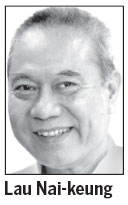Think outside the box about our city's future
Updated: 2012-12-18 05:59
By Lau Nai-keung(HK Edition)
|
|||||||
Thinking outside the box is more than just a business cliche. It means approaching problems in new, innovative ways; conceptualizing problems differently; and understanding our position in relation to any particular situation in a way we had never thought before. This ability is much needed for Hong Kong to get out of its current social and political predicament.
Ironically, although we like to think of Hong Kong as an innovative city, institutionally and collectively we seem merely to be repeating ourselves recently. If there are indeed some "deep-level contradictions" in our society, solutions certainly cannot be found carrying on business as usual.
We're told to "think outside the box" all the time, but how exactly do we do that? How do we develop the ability to confront problems in ways other than the ways we normally confront problems? How do we cultivate the ability to look at things differently from the way we typically look at things?
Historically, Hong Kong has gone through several transformations. It was first a fishing village, then an entrepot and later a manufacturing powerhouse, before it arrived at its current position as a financial center. It is interesting that people in Hong Kong seem to think that history ends here and that a financial center is the greatest thing that we can ever hope to be.

Some of us are also proud of the fact that we have a "service economy", thinking that service work must somehow always be better than manual labor. In fact, there are a lot of low paying and low value-added jobs in the service sector. The sector is diversified, as "service" is a very broad concept, but we can't fail to notice the pattern of a "dual economy".
A dual economy is the existence of two separate economic sectors within one country, divided by different levels of development, technology, and different patterns of demand. The concept was originally created by Julius Herman Boeke to describe the coexistence of modern and traditional economic sectors in a colonial economy.
The dual economy that Hong Kong has is structured by the financial service industry and the tourism industry. As some of our established roles became obsolete and the development of new ones abortive, the dominance of these two industries would be felt even more intensely.
Having two separate economic sectors may not be a bad thing, and our government usually refers to them as our "pillar industries" (whereas, supposedly there are more). When our economy is dominated by only two kinds of economic activities, contradictions soon pile up. It is now quite clear that our tourism industry is unsustainable as it earns its profits by externalizing the cost to the rest of us. Factories create pollution; the service sector also creates externalities. Everything has a place in our society, what we need is moderation.
Thinking outside the box requires us to look at problems from an unconventional angle. When CY Leung does his consultations for the preparation of his first policy address, he should ask the participants what they want Hong Kong to be like in the next ten years. Instead of going into details of specific policies, we should first talk about principles, priorities and visions. After that we can work backwards to formulate a concrete plan.
If we think outside the box, the current problem of too many tourists can be solved other than limiting the number of visas (or equivalent documents for mainland tourists to visit Hong Kong). An administrative solution takes the status quo as given, but a political solution can involve a change in paradigm: can Hong Kong become a city that attracts a limited and specific type of tourists? It is a pity that people have the guts to rally and fight the police, but no one in Hong Kong dares to demand that we tax our name-brand products, nor do they have the imagination to do so.
Thinking outside the box also requires a government that works, as political solutions can be implemented only by a strong administration. If CY Leung can lead a discussion in principles, and lay out a plan for the coming five to ten years, we should all give him a chance.
The author is a member of the Commission on Strategic Development.
(HK Edition 12/18/2012 page3)